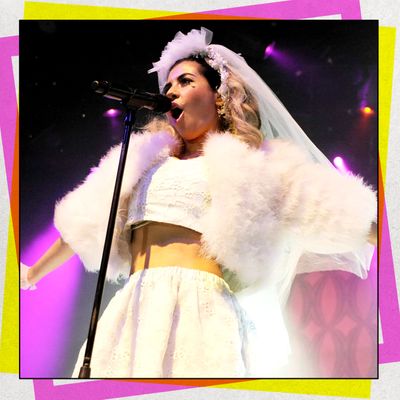
MARINA’s more than 15-year journey across pop music, ranging from The Family Jewels (2010) and Electra Heart (2012) to 2015’s Froot and then Love + Fear (2019), has never stuck to one thing. Consider the euphonious contrast between a fast and chaotic banger like “Radioactive” and a more subtler pop, slow-burning experience like “Orange Trees” — each, while worlds apart in sound, assist well in their depiction of the MARINA period during which they were released. Yet, amid her evolution, the message of Marina Diamandis’s (f.m.a. Marina and the Diamonds) work has been consistent and synonymous with who MARINA is (in her own words: a “sassy bitch”). Belying these sometimes-exaggerated personae, though, is an emotional wellspring; an ally (see the bubblegum bliss of “Primadonna,” clutched in the hearts of the gays); a mystic (“Purge the Poison,” she says, is her “witchiest” song to date); and an uncompromisingly vulnerable and honest singer.
All facets of her artistry and identity coagulate on MARINA’s new album Ancient Dreams in a Modern Land, owed to, as the Welsh singer puts it, “the need to grow.” The new record is both another reflection of its time of creation, a two-year off-season, and a mirror to the 35-year-old’s past. Led by its upbeat title track preaching revolt and disobedience (“You don’t have to be like everybody else / You don’t have to fit into the norm / You are not here to conform / I am here to take a look insidе myself / Recognize that I could bе the eye, the eye of the storm”), it bleeds with the bouncy, familiar aura of earlier MARINA eras like the seminal Electra Heart. But, by this album’s end, there’s a crack in the fun — her voice, on “Flowers” and “Goodbye,” offers flashes of misery fused with hope. Eventually, rebellion concedes. These final songs survive as beautiful conclusions to an album that candidly showcases Diamandis’s embrace of the ebbs and flows of her career and life. “There is no one message, but I would hope that people feel free when they’re listening to it,” she says.
MARINA’s sector of pop is singular but was designed to be populated by her creative kindred — the likes of Ava Max, Kim Petras, girl in red’s recent “You Stupid Bitch,” Ellie Goulding’s hit “Lights,” Charli XCX’s 2017 “Femmebot,” Allie X’s gem “Hello,” and the varied beats of Billie Eilish’s early don’t smile at me EP. Still, it is Diamandis’s distinct vocal resonance and cheeky, enigmatic attitude that’s sustained it. The singer recently teleported us to multiple significant moments in her career that, all told, illustrate her hold on the addicting, disjointed sonic world she’s mothered. It got weird, nostalgic, and — duh — pretty gay.
Song on Ancient Dreams that best showcases your trajectory in music
[On Ancient Dreams in a Modern Land], I wanted to write about how challenging it is to resist conforming, in whatever way that applies to you. We all have those pressures. But I think, looking back on my career, it has been a challenge for me. And I feel positive about the fact that I’ve been able to mold my own path when that path didn’t really exist for me when I first got signed [to Neon Gold Records] 12 years ago. So it’s about resisting that. It’s about having confidence. None of us are here to play it small, or to not live authentic lives. I think what’s happened recently, socially, and even with the pandemic has inspired those kinds of thoughts in a lot of people that I’ve been talking to.
That is a complex question. Sonically, I would probably say “Venus Fly Trap” blends that very sassy, lyrical energy with quite bombastic, bouncy, and energetic production [that] has been something that I’ve always done at least once on every album. Like, “Oh No,” [or] “Primadonna.” It’s kind of like a trade of my songwriting now at this point.
MARINA song that belongs to the gays
[Laughs] I don’t want to be obvious, but I was going to say “Primadonna.” [That] or “[How to Be a] Heartbreaker.” Those songs really helped me establish a huge gay, LGBTQ fan base. They really changed my career because I’ve been able to have the freedom I have as an artist because of the loyalty of my fan base and that’s not something that I’ve ever taken for granted.
[“Primadonna”], I think … okay. So, gay culture gets camp humor very well and utilizes it very well. And I’ve always [had that same attitude toward camp] ever since I was young. So “Primadonna” is like a celebration of that; it’s also a celebration of being feminine and being contrary. And I do think the queer people in my life who I know well have always had a better grasp of what it is to possess femininity and to feel feminine than the straight men in my life that I know. And that’s something that I think me and my gay family always really connected on. So it makes sense that “Primadonna” is their anthem, because it’s a send-up of that, but it’s also a celebration of that.
Froot song that most resonates with you now
“Happy,” for sure. Sometimes it’s nice to just be struggling with something, to surrender to it. And I don’t think human beings can do that very easily, ’cause we always want to push through and try and resolve things. But that really felt like a place of surrender for me. And it marks a change in my life at that time.
After Electra Heart, even though I love the record, I found actually marketing and campaigning it quite difficult because people weren’t really taking it with context. I was still relatively new as an artist at that point. And they thought that I was singing those songs unironically. So, it was quite hard. Froot was a liberating album to make because I made it on my own. That’s probably [the album] closest to my heart.
Biggest misconception about MARINA’s role in pop music
I think the biggest misconception is this comment that always has come up, which is, “Oh, she’s not recognized enough,” or, “She’s underrated.” And I think what people have misunderstood is that I just haven’t matched people’s, like, cultural values of what it is to be commercial or successful. And so, when they make those comments, I think it’s in reference to that. But for me, it’s much wider. The way that I see my career is that it has to be personalized to who I am. And I wouldn’t have necessarily suited a more commercial career. I don’t know how I would have coped with that when I was younger.
Also, if [I wanted to be more commercial], I would have been by now; I would have specifically chosen to go that way. [And if I did], I probably wouldn’t have written albums on my own anymore, because my lyrics are much weirder when I write on my own, and radio doesn’t generally play music that has these types of lyrics. So that’s [my] choice. This is probably going to sound fake, but it’s not: I just don’t think of songs like [flops or hits]. I know fan communities do, but I don’t. I haven’t been a typical top-ten, singles-charting artist; that’s just never been one of my main goals.
So that’s the biggest misconception — I feel so happy with the path that I’ve created for myself.
Weirdest lyric
Ahh! There’s loads on Electra Heart. I mean, like, “I want blood, guts, and angel cake / I’m gonna puke it anyway” [on “Teen Idle”]. On this record, on “Goodbye,” there’s the mother line: “I’ve been a mother to everyone else / To every motherfucker except myself / And I don’t even have any kids.” I like painting images; I love setting the scene for someone. With [new songs] “Purge the Poison” or “Man’s World,” I do the same thing — it felt very teenage to me. Which [also] suited the “Teen Idle” concept.
Song you identify with most as MARINA
Even though it’s new, I think “Venus Fly Trap” is the pinnacle of sassy-bitch Marina. For an older song, I’d probably say “Froot.” It was so fun to make, and my whole album was built around that song. I think it’s one of the best displays of my songwriting and melodic identities.
“Heartbreaker” rule you still follow
I think there’s only one left, which is rule No. 1 is that you’ve “got to have fun.” All of the other ones I’ve grown out of, unfortunately. [Not] pure anymore. [Laughs]
Most technically challenging song to sing live
This whole next record [laughs]. I’m like, Why do I do this myself? I’m the one writing, I could do simpler melodies. Do I have to jump octaves every ten seconds? Yeah, this album is hard. “Purge the Poison” is quite hard, “Venus Fly Trap,” as well. They’re just so fast. When I sing them in the studio, I’m doing the verses [and] do them like eight times, and then I move on to the pre-chorus. I wanna say it’s impossible [to perform them all the way through in one take], but I don’t think it is. It’s just … you kind of need time on tour to mold your voice around certain songs. Hopefully by the time I get on tour, I have managed it.
Welshest song
I would say “I Am Not a Robot.” It’s a soft, super-beautiful ballad. That’s what Welsh people are known for, big ballads.
Song whose relevancy has changed the most
[With “Sex Yeah”], I [was] absorbing what was happening at the time and what I was perceiving. I don’t know if I’d write that kind of song now, but I think at the time, in 2012, it felt relevant. We were going through, I mean, we still are to an extent, but you know, we were still going through this judging phase of looking at how certain female artists dress. And it was like, “Oh …” For example, Lady Gaga, she’s very provocative — she’s a provocateur — and it’s not a negative thing that she chooses to wear what she chooses to wear. [But] that was just so [ingrained] in our psyche at the time, I felt. I wanted to think about how that related to women historically, which is very much what I’m still talking about with “Man’s World” and “Purge the Poison.”
This interview has been edited and condensed for clarity.
More From This Series
- Hans Zimmer on His Most Unusual and Underrated Scores
- The Coolest and Craziest of TLC, According to Chilli
- Kim Deal on Her Coolest and Most Vulnerable Music


